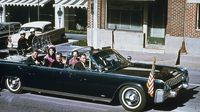The recent release of documents related to the assassination of former U.S. President John F. Kennedy has sparked a wave of conspiracy theories and misinformation, particularly surrounding claims about President Joe Biden and the involvement of Jewish individuals in Kennedy's death.
On March 25, 2025, the Trump administration made public thousands of previously classified records concerning JFK's assassination, an event that has long fascinated historians and conspiracy theorists alike. These documents, which are now available through the U.S. National Archives, were released following an executive order from former President Donald Trump.
However, the timing of the release has coincided with a resurgence of false claims online, particularly on social media platforms like X (formerly Twitter). A post from actor-turned-influencer Russell Brand on March 18, 2025, claimed that JFK Jr. had warned that Joe Biden was a traitor to America before his untimely death. This post, along with similar messages from other conservative influencers, has fueled speculation and conspiracy theories linking Biden to JFK's assassination.
One of the documents that has drawn attention is a partially redacted FBI letter dated September 1994, which was sent to then-Senator Biden. The letter stated, "Dear Sen. Biden: You are a traitor..." and was signed "John F. Kennedy Jr." The authenticity of this letter has been called into question, especially since JFK Jr. died in a plane crash in 1999. Steven Gillon, a professor of history at the University of Oklahoma and author of a biography about JFK Jr., stated in an email to AFP on March 25, 2025, "Absolutely it is a hoax. John never wrote that letter." Gillon also emphasized that the letter had been included in documents released to the public in 2000 as a result of a Freedom of Information Act (FOIA) request made by the Associated Press.
In the wake of the document release, various online personalities have attempted to assert that the documents implicate Jewish individuals or Israel in Kennedy's assassination. For example, far-right extremist Stew Peters, who has a history of promoting conspiracy theories, claimed that Jews were responsible for sinking the Titanic and are now involved in a cover-up regarding JFK's death. Another influencer, Myron Gaines, suggested that there was "proven" Israeli involvement in the assassination, despite the lack of credible evidence supporting such claims.
Interestingly, the documents released by the National Archives do not substantiate these allegations. In fact, historical records from Israeli archives, released in November 2013 to mark the 50th anniversary of Kennedy's assassination, indicate that Israeli leaders had no knowledge of who killed the American president at the time. Golda Meir, who would later become Israel's prime minister, speculated that Lee Harvey Oswald might have been a communist agent acting on behalf of Cuban leader Fidel Castro.
Moreover, declassified communications from the National Security Agency reveal that, shortly after Kennedy's assassination, a Palestinian source sent a message suggesting that the Jews were responsible for the president's murder. This narrative has been perpetuated by various anti-establishment figures and has been linked to broader anti-Semitic conspiracy theories.
As the digital landscape continues to evolve, the proliferation of conspiracy theories has become more pronounced, with social media platforms serving as breeding grounds for misinformation. The ease with which individuals can share and amplify these theories has made it increasingly challenging to combat false narratives.
For instance, in the days following the document release, numerous posts on platforms like X and Facebook have circulated the idea that Kennedy's assassination was part of a larger conspiracy involving Jewish individuals. This has been met with backlash from historians and fact-checkers who emphasize the need for accurate information and the dangers of spreading unfounded claims.
The prevalence of such conspiracy theories reflects a troubling trend in contemporary discourse, where sensationalism often trumps factual accuracy. The Kennedy assassination, perhaps the most analyzed political murder in American history, remains a focal point for conspiracy theorists, many of whom are drawn to narratives that paint complex events in simplistic, often anti-Semitic terms.
In response to the recent surge in conspiracy theories, fact-checking organizations have been working diligently to debunk false claims and provide clarity on the historical context surrounding JFK's assassination. The U.S. fact-checking organization PolitiFact, for instance, has previously debunked claims linking Biden to plots against Kennedy, reiterating that such assertions are baseless and unsupported by evidence.
As the conversation surrounding the JFK assassination continues, it is essential to approach the topic with a critical eye and a commitment to truth. The release of these documents has the potential to shed light on a pivotal moment in American history, but it also serves as a reminder of the power of misinformation and the need for vigilance in the face of conspiracy theories.
In conclusion, while the newly released documents provide insights into the events surrounding Kennedy's assassination, they also highlight the ongoing challenges posed by misinformation and conspiracy theories in the digital age. As society grapples with these issues, it is crucial to prioritize factual accuracy and engage in thoughtful discourse about historical events and their implications for contemporary politics.





